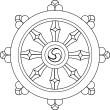fiction.wikisort.org - Writer
Mangong (Korean: 만공; Hanja: 滿空, 1871–1946) or Song Mangong was a Korean Buddhist monk, independence activist, scholar, poet, writer, and philosopher during the Japanese occupation of Korea. Mangong was born in Jeongeup, Jeonbuk Province in 1871 and was ordained at the age of 14.[1] Though he spent three years teaching Zen tradition in Mahayeon Temple in Keumkang Mountain and briefly served as the abbot of Magok Temple, he spent most of his life teaching Zen at Deoksung Mountain in Yesan, Chungnam Province. Mangong revitalized the Zen tradition of Korean Buddhism along with his teacher, Zen Master Kyongho.[2]
Mangong 만공 滿空 | |
|---|---|
 Mangong, circa 1940 | |
| Title | Zen Master |
| Personal | |
| Born | Korea |
| Religion | Buddhism |
| School | Seon Buddhism |
| Part of a series on |
| Zen Buddhism |
|---|
 |
| Part of a series on |
| Buddhism |
|---|
 |
|
See also
- Korean Buddhism
- Korean Seon
- Kyongho
- Hanam Jungwon
- Jeongang
- Daewon
- Seungsahn
- Jinje
- Han Yong-un
- Chunseong
Gallery
- Letter of Mangong (1930)
- Temple of Junwol, 1941
- Temple magoksa of monks (1930)
References
- "Wolmyeon Mangong". Bulgyo Sinmun. 12 January 2005. Retrieved 25 October 2015.
- "Temple plaque of Zen Master Mangong". Hyeondai Bulgyo. 15 November 2000. Retrieved 25 October 2015.
Web site
- http://www.ibulgyo.com/news/articleView.html?idxno=63691
- http://www.ibulgyo.com/news/articleView.html?idxno=84271
- http://www.ibulgyo.com/news/articleView.html?idxno=85495
- http://www.ibulgyo.com/news/articleView.html?idxno=90104
Текст в блоке "Читать" взят с сайта "Википедия" и доступен по лицензии Creative Commons Attribution-ShareAlike; в отдельных случаях могут действовать дополнительные условия.
Другой контент может иметь иную лицензию. Перед использованием материалов сайта WikiSort.org внимательно изучите правила лицензирования конкретных элементов наполнения сайта.
Другой контент может иметь иную лицензию. Перед использованием материалов сайта WikiSort.org внимательно изучите правила лицензирования конкретных элементов наполнения сайта.
2019-2025
WikiSort.org - проект по пересортировке и дополнению контента Википедии
WikiSort.org - проект по пересортировке и дополнению контента Википедии


